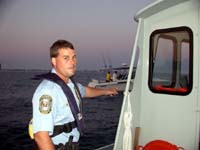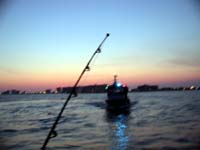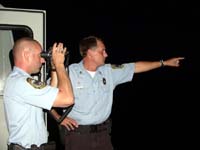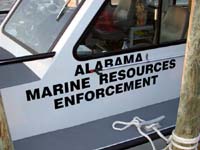
|
Features
|
|
|
|
Books
|
|
|
|
Fun & Games
|
|
|
|
Contact Us
|
|
|
John's Journal... Entry 251, Day 1
FISH COPS: THE WATCHDOG OF THE MARINE RESOURCES
What Is AMRED?
 Editor's
Note: As you know, salt-water fishing has a numberof size limits, bag
limits and restrictions. But do you know who enforces these laws? Who
keeps the commercial fishermen, the netters, the oystermen and the recreational
fishermen from breaking the law, taking too many fish and/or fishing in
closed areas? In my home state of Alabama and many other states, the Enforcement
Division of the Marine Resources Department of the state's Department
of Conservation and Natural Resources (DCNR) has this responsibility.
To learn more about who the fish cops are, what they do, and why they
are important to all of us, I went on patrol with them in coastal areas
recently at night and during the day. I learned that they have some of
the most-sophisticated surveillance equipment of any law enforcement agency.
Besides radar, they have night-vision binoculars and other devices to
spot and track law violators. They also do drug enforcement, health-department
enforcement and immigration enforcement and are cross-trained with many
state and federal agents. This week we'll meet Alabama's fish cops, the
Alabama Marine Resources Enforcement Division (AMRED), and learn what
they do.
Editor's
Note: As you know, salt-water fishing has a numberof size limits, bag
limits and restrictions. But do you know who enforces these laws? Who
keeps the commercial fishermen, the netters, the oystermen and the recreational
fishermen from breaking the law, taking too many fish and/or fishing in
closed areas? In my home state of Alabama and many other states, the Enforcement
Division of the Marine Resources Department of the state's Department
of Conservation and Natural Resources (DCNR) has this responsibility.
To learn more about who the fish cops are, what they do, and why they
are important to all of us, I went on patrol with them in coastal areas
recently at night and during the day. I learned that they have some of
the most-sophisticated surveillance equipment of any law enforcement agency.
Besides radar, they have night-vision binoculars and other devices to
spot and track law violators. They also do drug enforcement, health-department
enforcement and immigration enforcement and are cross-trained with many
state and federal agents. This week we'll meet Alabama's fish cops, the
Alabama Marine Resources Enforcement Division (AMRED), and learn what
they do.
PHILLIPS: Today we're talking to Captain Chris Blankenship
with AMRED. What does the Enforcement Division of Alabama's Marine Resources
(AMRED) do?
BLANKENSHIP: We check all the salt-water, commercial and recreational
sizes and limits of the fish being caught. We enforce oystering laws,
gill-netting laws and shrimping laws, and we check the seafood shops and
fish houses to make sure that no illegal fish are being bought and sold.
We are also the enforcement arm for the Alabama Department of Public Health.
We help prevent contaminated and adulterated oysters and other seafood
from coming to the market.
 PHILLIPS:
How far does your enforcement limit extend?
PHILLIPS:
How far does your enforcement limit extend?
BLANKENSHIP: State waters go out to 3 miles. We are also deputized by
the National Marine Fishery Service to enforce the law out to 200 miles
off the American Coast. With that enforcement responsibility from the
National Marine Fishery Service, we can go anywhere in the open Gulf of
Mexico and check for violations. We patrol consistently out to 70 or 80
miles offshore. We are also cross-designated as customs officers and deputized
by the U.S. Customs Service to board ships and look for customs violations.
Because we are also state police officers, we have the authority and the
responsibility to search for illegal drugs anytime we stop a boat to check
for any violations.
PHILLIPS: So, in other words, you are super cops not
just fish cops. I went on a night patrol with the AMRED and met Enforcement
Officer George Pose. Officer Pose, tell me about the binoculars you are
using.
POSE: These are Fujinon Techno Image Stabilizing Binoculars. These binoculars
are electronic image-stabilizing binoculars. Some nights when we are on
patrol, the weather gets a little rough, but with these binoculars we
can focus on a boat and the image won't bounce around as it will with
regular binoculars. These binoculars help us to better observe boater
and fishing activities at night.
 PHILLIPS:
You also have night vision, like the Special Forces use. When do you use
your night-vision equipment?
PHILLIPS:
You also have night vision, like the Special Forces use. When do you use
your night-vision equipment?
POSE: Mainly when we are patrolling offshore at night. When we are patrolling
inshore, there is usually enough ambient light for us to be able to see.
PHILLIPS: What do you usually look for when are patrolling
at night?
POSE: People netting fish in the illegal areas. It is illegal to set a
gill net in any river, stream or canal in Alabama. There are certain areas
that are open for gill netting and other areas that are closed. We have
to make sure that the netters only put out their nets in the open areas.
We have both recreational and commercial gill netting in Alabama, and
we have very strict laws as to what the netters can do. For instance,
they cannot leave the gill net set out without their being there to watch
it. Another violation that we often find is a poacher running another
fisherman's crab traps at night. We also look for shrimpers who may be
shrimping in closed areas at night. Late in the afternoon, and sometimes
at night, we check the charter boats and the private boats that are coming
into Perdido Pass after a day of fishing.
 PHILLIPS:
What do you check the charter boats for?
PHILLIPS:
What do you check the charter boats for?
POSE: We check to make sure they don't have over the limit of any salt-water
fish and that all their fish are the legal- length limits.
PHILLIPS: What else are you checking for at night?
POSE: Anytime we do a boat check, we also do a boaters' safety check to
make sure they have the proper personal flotation devices. We check to
make sure they have kill switches on their motors. We make sure they have
a Vessel Operator's permit. We make sure that their registration is current,
and that all their lights are working.
TOMORROW: CHECK FOR DRUGS
Check back each day this week for more about FISH COPS: THE WATCHDOG OF THE MARINE RESOURCES ...
Day 1 - What Is AMRED?
Day 2 - Check For Drugs
Day 3 - Reef Violations
Day 4 - Lady Fish Cops
Day 5 - Heidi Lofton, The Other Lady Cop